





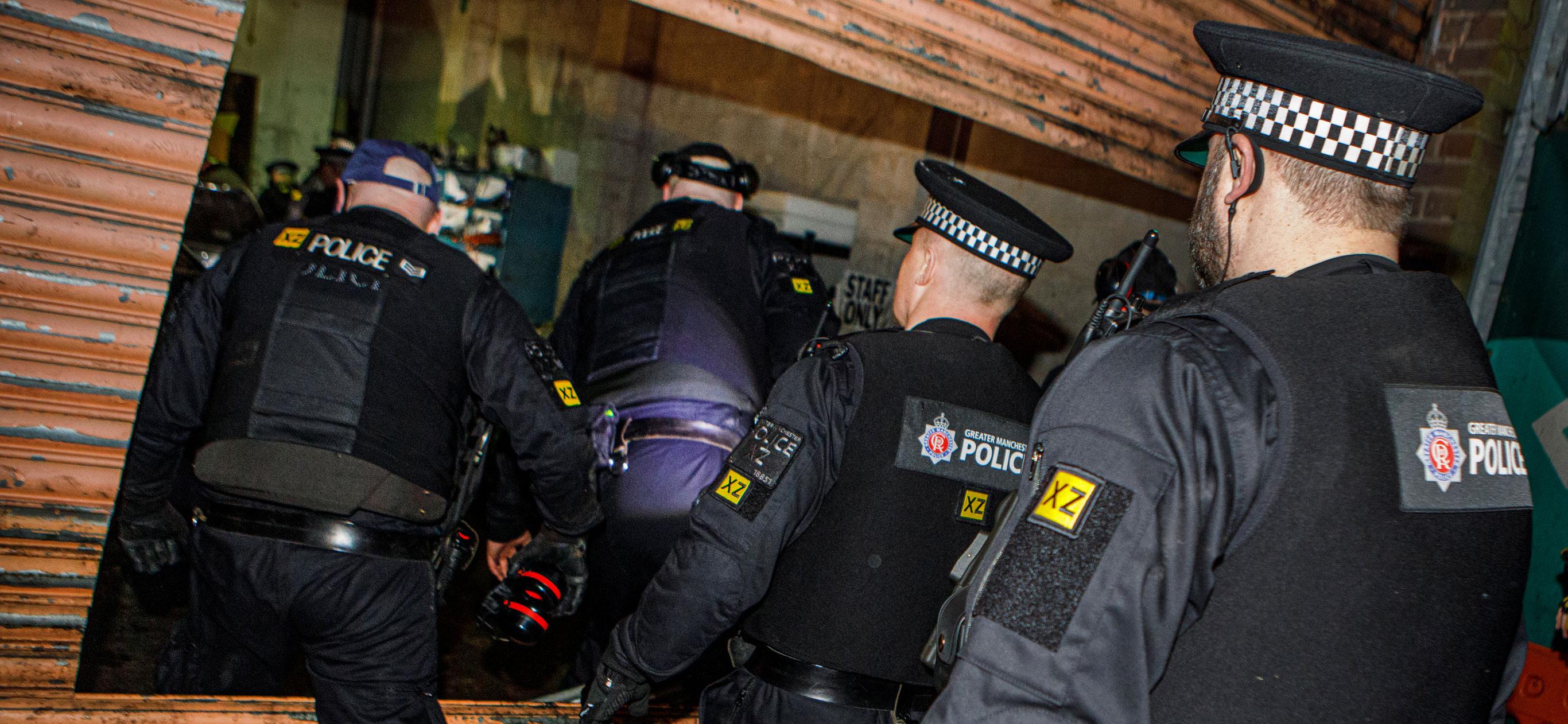
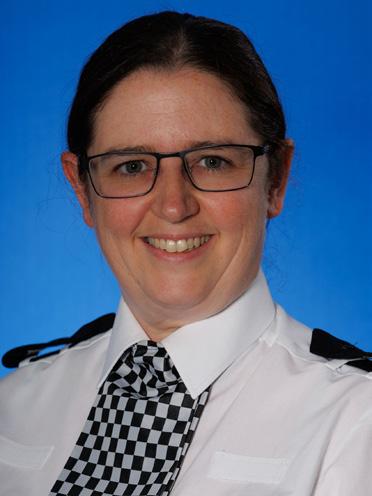
Dear all, March’s edition of District Brief is the last of the financial year and marks my first six months as your district commander.
I start by offering my thanks to all of you for how welcome you have made me here at Bolton and for the effort you have all put into to improving the service we offer to both communities and victims.
Of course, in the last month or so we have experienced a number of changes to our SLT. We wish both Ian and Alan the very best in the next stages of their careers. We welcome Det Supt Rick Arthern and Supt Steve Malone - I assure you that these new appointments will compliment and sustain our strategic direction.
As we reach the end of year, I wanted to reflect on how far we have come together towards reaching our goals. We end the year positioned to achieve 8 out of our 11 key performance indicators. That is a healthy position and for victims of crime across Bolton is a positive indicator of a police service invested in building public confidence.
The 12 months ahead will no doubt continue to be challenging but also an exciting opportunity to set ourselves up for a strong contribution to the force’s next HMICFRS PEEL Inspection.
The end of March brings with it a change of the clocks and lighter nights. It also marks the end of the holy month of Ramadan with the celebration of Eid al-Fitr. Eid Mubarak to all our colleagues who have been observing Ramadan.
Best wishes to you all.
Helen
The end of February saw officers from Bolton Neighbourhood Crime Team (NCT) work with other teams across the force in a bid to tackle suspected ‘chop shops’.
Together with the Tactical Aid Unit (TAU) and Stolen Vehicle Examination Unit (SVEU), the NCT executed warrants in Wythenshawe, leading to two arrests.
The warrant led to the recovery of a number of stolen vehicle parts as well as vehicles were seized and suspected of being used in connection with other crimes.
A 53-year-old man has been arrested on suspicion of conspiracy to steal motor vehicles, while a 46-year-old man was arrested on suspicion of handling stolen goods. The 53-year-old has been bailed pending further investigations and the 46-year-old has been charged and remanded to appear on Monday 14 April. These warrants are part of Operation Gosport, an investigation into the theft of motor vehicles and the conspiracy to steal motor vehicles in Bolton, other areas of Greater Manchester, and nationally.
Sergeant Thomas Bayliss, from Bolton’s NCT, said: “Hard work and long hours from officers within the

Neighbourhood Crime Team, with support from TAU, the Stolen Vehicle Examination Unit, and the Crime Scene Investigation team, helped the force identify a suspected ‘chop shop’ in the south Manchester area.
“I’d like to give a special mention to the officer in charge PC Ascroft who worked incredibly hard during every stage of this investigation with support from PC Green.
“This operation shows our communities that we will not tolerate vehicle crime and shows the public with confidence that their reports of crime are being taken seriously and criminals are being dealt with.”
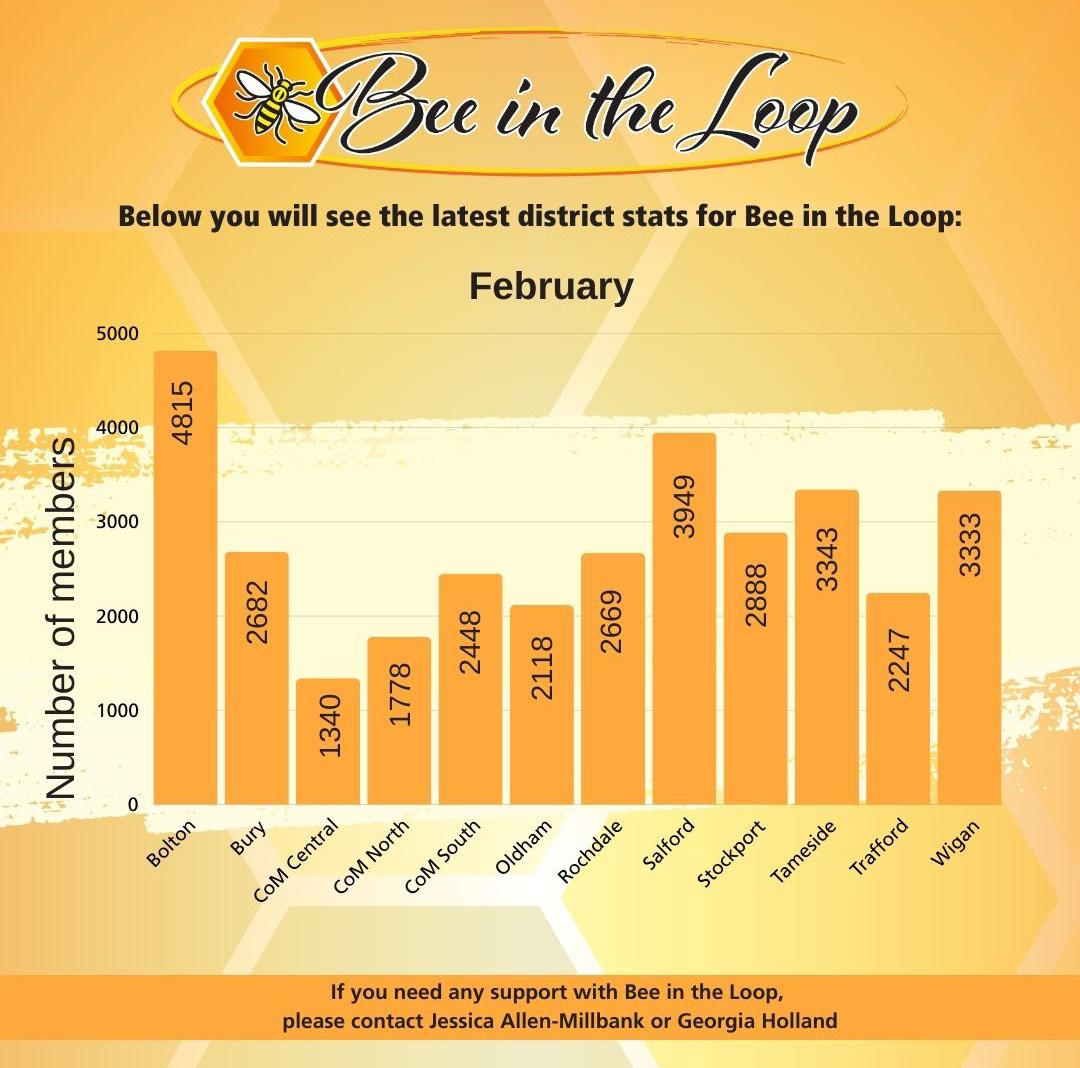
Operation Affect, GMP’s ‘Clear Hold Build’ (CHB) initiative in Rochdale’s Freehold estate, has been recognised nationally for its creative and dedicated use of civil powers, injunctions, and robust partnership work to sustainably tackle embedded criminality by working with the community itself.
The initiative was designed to:
• Clear the area;
• Hold the location to prevent criminals exploiting the vacuum created by the original disruption; and
• Build a prosperous, resilient community in collaboration with our partners and Rochdale Boroughwide Housing (RBH).
Det Supt Andy Farrell, national lead for serious organised crime at the National Police Chiefs’ Council, wrote to ACCs Matt Boyle and Danny Inglis saying: “Whilst the stats speak for themselves, I was extremely impressed around the use of closure orders to restrict access to communal areas within the tower blocks. There has clearly been some thought around the communication and engagement strategy which has maximised opportunities to highlight what has been achieved through positive key messaging.
“Clear, Hold, Build is now embedded across 42 forces and 61 sites; what I can say with confidence is that the delivery in the Freehold estate is
probably one of, if not the best, example of CHB being delivered currently across policing.”
In November 2024, as part of ongoing Op Affect work in the area, GMP secured its first Open Space Closure Order Zone on the Freehold estate. The order, which was secured for a period of three months, prohibits non-residents from congregating in stairwells, on landings, bridges and near bin chutes, and within open spaces attached to properties – all the issues which our community told us were affecting them the most. The results have been positive, and the team has established that there is no need to reapply for an extension to the order.
As the closure order comes to an end, GMP Rochdale has received
positive feedback from the community who have said ‘this is the best thing to happen around here in a long time’, ‘we definitely feel safer in the evenings’, ‘anti-social behaviour in general has decreased’, and ‘thanks to you all for making Freehold a place to feel proud to live in again.’
Inspector Meena Yasin, who has been driving this initiative, said:
“This operation has very much been community-focused and is the product of hours of interaction with local residents and partners, and represents what they want from their police force.
“I’m proud we could make this commitment to the community and my team and I look forward to future investment and improvements in the area.”
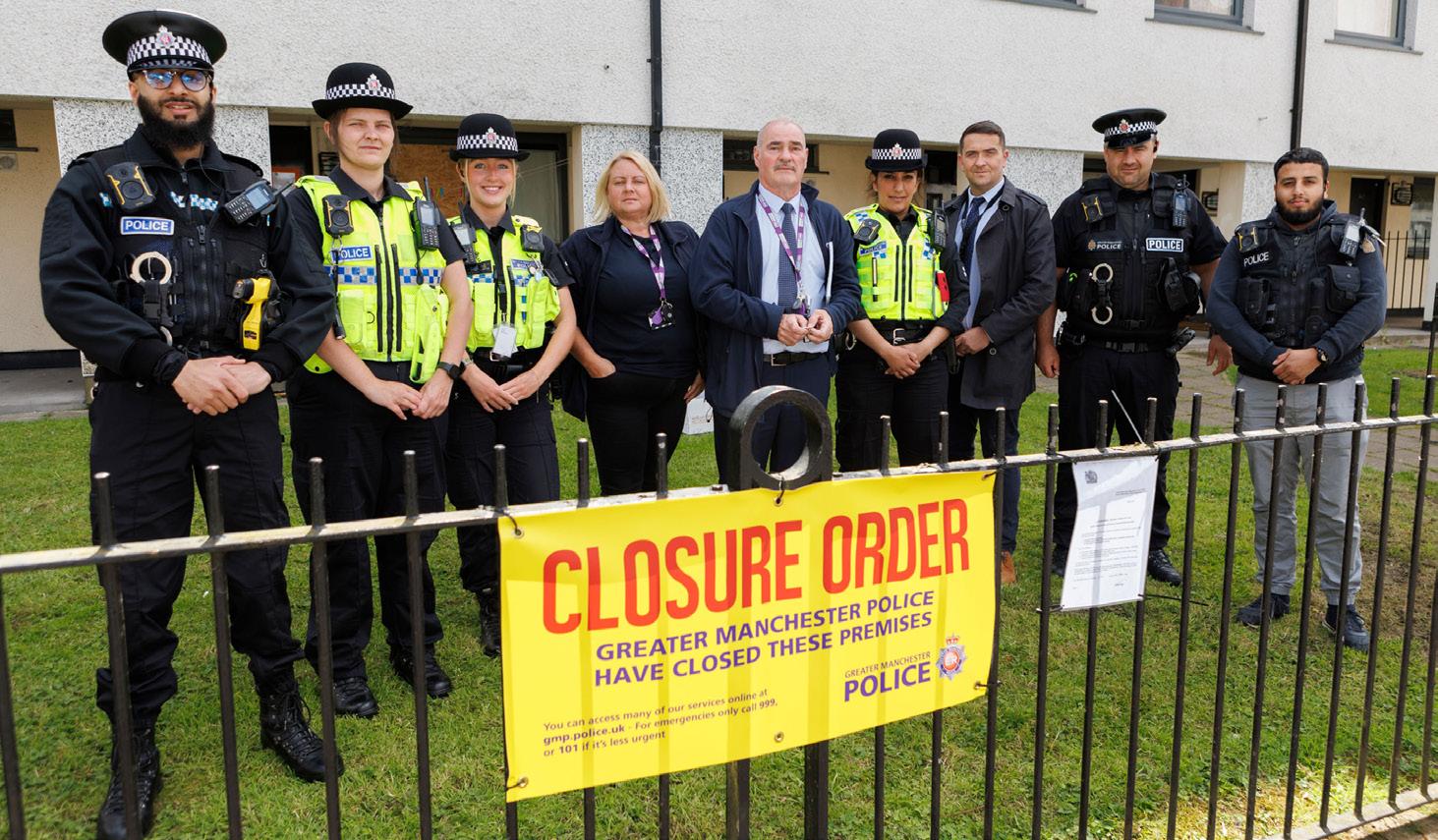
Seven officers from GMP’s Tactical Aid Unit (TAU) are planning to walk the length of Hadrian’s Wall to raise money for the British Heart Foundation in memory of PC Craig Higgins, who served with the TAU from 2008 until his sudden death after becoming unwell while on duty in 2022.
The team will be undertaking the UK’s fourth longest walk: the full length of Hadrian’s Wall, just short of 90 miles. They plan to leave from Bowness-On-
Solway in Cumbria on Sunday 20 April and finish in Wallsend in North Tyneside on Friday 25 April 2025, stopping at campsites or wild camping where permissible along the way.
The team have already more than doubled their initial target of £1000, but would welcome any further donations.
You can make a donation at https://www.justgiving.com/page/ craighigginschallenge or by scanning the QR code on this page.

Bookings have now opened for the Chief Constable’s annual roadshow, where the force joins together to celebrate our achievements over the past year and discuss how we want to progress in the future.
Last year’s events were fully booked, so make sure you claim your place as soon as you can!
This year’s roadshow events will be held on the following dates:
• Tuesday 6 May, Queen Elizabeth
Hall, Oldham – 10am to 12 noon
• Tuesday 6 May, Queen Elizabeth Hall, Oldham – 1:30pm to 3:30pm
• Wednesday 7 May, Concorde hangar, Manchester Airport – 10am to 12 noon
• Wednesday 7 May, Concorde hangar, Manchester Airport –1:30pm to 3:30pm
• Friday 9 May, Midland Hotel, city centre – 10am to 12 noon (this session is now fully booked)
• Friday 9 May, Midland Hotel, city
centre – 1:30pm to 3:30pm (this session is now fully booked)
• Monday 12 May, Concorde hangar, Manchester Airport – 10am to 12 noon
• Monday 12 May, Concorde hangar, Manchester Airport – 1:30pm to 3:30pm
You can book your place and let us know any questions you have for the Chief Officer team at https://forms.office. com/e/vZT3qqMhe9.
In February 2025, GMP welcomed visitors from the Metropolitan Police Service (MPS) and An Garda Síochána, Ireland’s national police and security service, to learn more from our work around digital evidence management.
The visits were facilitated by GMP’s Digital Evidence Management System (DEMS) lead Inspector Ainscough, with the aim of sharing valuable insights into effective use of DEMS with our colleagues. The visit not only demonstrated the importance of collaboration between UK forces but also indicated just how GMP’s efficiency and effectiveness with DEMS is being noticed as leading the way both nationally and internationally. MPS Supt Paul Southern said: “The goal of our visit was to understand best practices from GMP in the areas of evidence.com and digital evidence management. The visit will help MPS improve processes, streamline operations, reduce redundancies, and boost productivity. Additionally, the visit enabled us to share projects for mutual support and feedback, enhance efficiencies in MPS’s current tech solutions and understand automation capability.”
Garda contractor Derek Gallagher said: “Many thanks for hosting us and for your time; the knowledge, experience and expertise you shared with us in relation to DEMS has been invaluable.

“It is invaluable to meet officers and develop relationships with a police force from a neighbouring country. The learnings from the visit to GMP demonstrated to us the benefits that can be achieved by using DEMS technology for community engagement with the public, business and other agencies. The discussions we had will help us make enlightened decisions planning the roll out of body-worn camera and Digital Evidence Management Systems nationally.”
Insp Mark Ainscough said: “GMP continues to lead the way on the technology front – forever advancing, upgrading and innovating for efficient working practices which best fight crime and protect our communities – yet collaboration remains key.
“It is all about learning from each other and it is important we share all we have learned during our growth. Sharing best practices and offering support to UK forces is important so that we all achieve greater efficiency, innovate faster, and drive better results for the communities we serve. GMP looks forward to facilitating more collaborative visits in the future.”
The visit comes in the wake of the GMP launch in January of evidence.com’s latest resource, Photobook, which ensures faster and more efficient sharing of digital evidence with investigative partners.
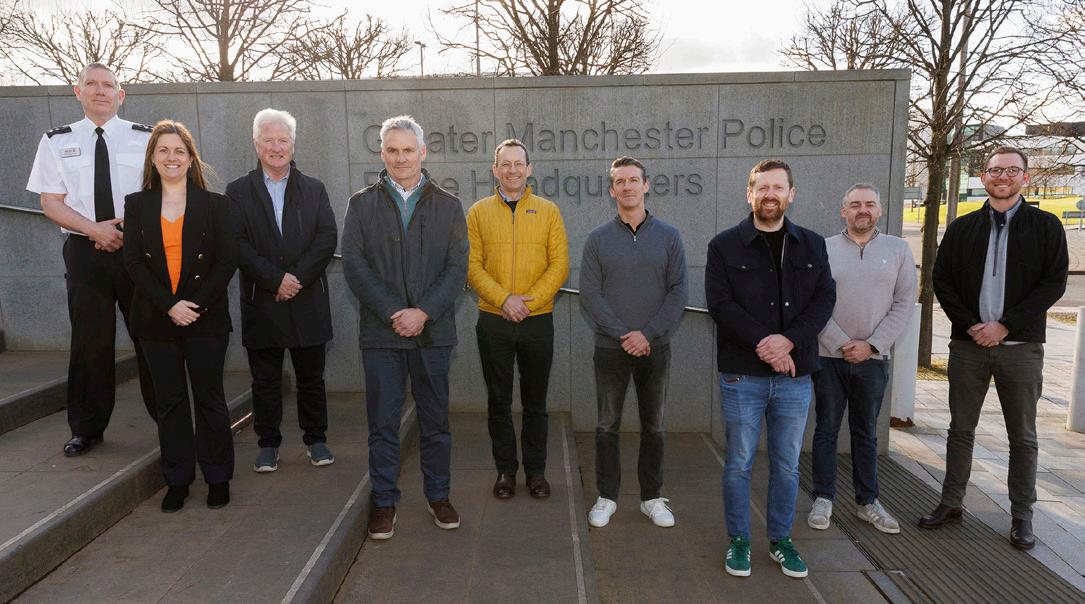
Four seminars on Operation Hampshire, which provides resources and support for police officers and staff who have been attacked or assaulted at work, will be delivered at the Sedgley Park chapel on Tuesday 18 and Wednesday 19 March 2025.
The seminars, which will consist of an input by Dave Brewster from the College of Policing followed by a question-and-answer session, will be held from 9:30 to 11:30am and 12:30 to 2:30pm on each day. While these sessions are mainly aimed at frontline leaders, such as sergeants and inspectors, senior leaders are also encouraged to attend, as is anyone who has an interest in the subject.
Dave was responsible for developing Op Hampshire as a national strategy for Oscar Kilo, the National Police Wellbeing Service. The strategy has now been adopted across all UK forces and is fully endorsed by key stakeholders, including the Police Federation, the National Police Chiefs’ Council and the trade union Unison. With over eight years’ experience in this specific field, Dave is considered a subject matter expert and is confident that the experience and insights accrued through this work are adaptable and transferable across sectors.
His key message is that it is essential for colleagues to feel valued as victims of assault and aggression. This requires a change in culture to recognise that every assault regardless of injury has a potential impact on the individual, the wider workforce and beyond. Op Hampshire calls for authentic, supportive leadership and a meaningful response to the realities our colleagues face.
To book a session please contact Inspector Jim Warren (james.warren@gmp.police.uk) and let him know your first and second choice for the sessions you want to attend.
Oscar Kilo’s Operation Hampshire aims to prioritise officer and staff wellbeing by ensuring that officers and staff who have been attacked are taken seriously as victims and that the impact of every assault is considered, regardless of injury.
It provides guidance, strategy and resources both for officers and staff who have been attacked while working, and for their supervisors and line managers.
Sometimes when we experience a traumatic event – such as being assaulted or subjected to a hate crime – the full impact of what has happened doesn’t hit us until days or weeks afterwards. The psychological effects of being attacked at work are often more insidious, and can last far longer, than the physical injuries.
Different people experience and respond to trauma in very different ways and with varying levels of resilience, formed by their own individual experiences; and there is no right or wrong way to experience trauma.
GMP recognises that the wellbeing of our officers and staff is paramount to maintaining a strong, effective police force, and we want to ensure that every officer or member of staff who is attacked while at work is treated like any other victim of a crime – that they have meaningful support, regular contact from the team investigating their case, and that the support that they receive has oversight at a senior level.
Operation Hampshire is a national initiative offering the necessary strategy and guidance to help forces respond effectively to assaults on police officers and staff, enabling us to get the basics right for our colleagues when they need us most.
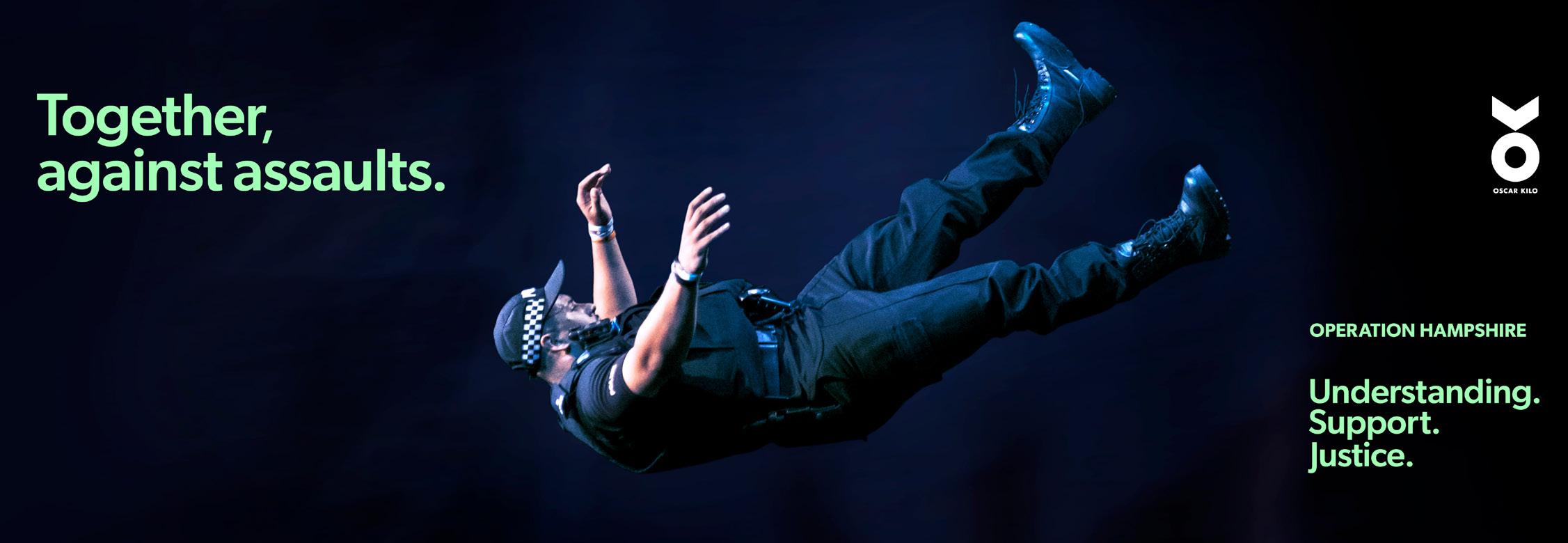
You can learn more about Op Hampshire, including information and resources for victims of crime, their supervisors and SLTs, on our dedicated intranet hub at Home > Operational support > Operation Hampshire, or by scanning the QR code on this page.

Ciara tells us about the benefits and challenges of Right Care, Right Person (RCRP), five months in.
How do you feel about RCRP so far? There has definitely been a reduction in calls coming through to us, and directing people to the right agency has benefited our call times. It has made me realise that we used to attend to a lot of jobs that we weren’t really able to help with, such as mental health jobs – all officers could do was check people were safe or bring them to hospital, whereas now we can direct them to mental health services straight away, where they get the help and support they need. I am more satisfied now that we are sending police to actual policing jobs rather than medical, mental or social issues that aren’t for the police.
What aspects have been positive for you?
The number of care homes reporting young people missing has been reduced. As a call handler, I saw a large number of these types of callers each shift; they usually weren’t conducting initial enquiries themselves and always had a reason why they couldn’t. Now, the RCRP policy clearly instructs them that we will not take the report unless enquiries are done first. There has also been a good reduction in calls for welfare checks, as the public and other agencies are now more aware of their duty of care and what actions they must take first before contacting police.
What challenges have you encountered with the new initiative? It was hard to get used to at the start –morally, we automatically want to help everyone and deploy to almost every call we get – however, it has been an eye-opener that we weren’t always actually helping when we were deployed to almost every job. We already knew police officers aren’t trained for complex medical or mental health issues, so it has been beneficial directing people to the right agency.
There was initially a lot of confusion surrounding missing reports; that took the most time for call handlers to become accustomed to, but as time has gone on, I think people have
definitely got the hang of it. There are still some grey areas on what to do with the logs for certain jobs, say if circumstances change or there is some kind of obstruction to completing checks, which we have raised with subject matter experts (SMEs) and call handling supervisors (HAC) over the last couple of months.
How did you overcome these challenges, and who or what helped you?
The SPOCs worked with each other to get a better understanding and shared thoughts on what would be the right route with these confusing or grey areas; we also raised our confusions or concerns with the SMEs and HAC to gain an understanding of the right path. We made sure the daily updates were accurate to avoid confusion. It also helped having people from other forces which had RCRP in place for a year or more come to assist in the beginning with their knowledge and experience.
How do you think the public feels about RCRP?
There are plenty of members of the public who are understanding, who take advice well and actually carry out checks and enquiries when instructed to do so. Some members of the public still do not agree with RCRP and have expressed this to call handlers – some of these people even work for partner agencies. Some callers express their dissatisfaction with RCRP over the phone and some refuse to take the advice given to them, while others may complain but will still follow our directions. Our call handlers know, from speaking with SPOCs, SMEs and HAC, to reiterate the policy advice and explain how the police are not able to provide efficient help and support for every matter raised to them but we can direct the caller to the right agency. When it comes to livechats and online submissions, some people do try and put up a bit more of a fight for police attendance, however the advice still remains the same.
Do you think RCRP may have contributed to improving public confidence?
I feel the public have become more
aware of what the police are there for and have more knowledge on what they should do before contacting police. One key public benefit of the initiative is that we are able to deploy officers to actual policing incidents faster now that they are not attending to all physical and mental health jobs.
Can you provide an example of when applying RCRP principles was particularly beneficial to a caller in crisis?
While taking a missing report for a person under 18, it became apparent that the caller had not made enough reasonable enquiries to locate them: they hadn’t checked with the young person’s friends despite having their contact details or checked places where they have previously been located. They were instructed to make these checks and called us back not long afterwards to advise that they had located the young person, whose phone had simply run out of battery, as a result of these checks.
What do you hope to gain from continuing RCRP in the future?
I hope that calls to police for physical, mental health and social issues continue to reduce, that people continue to make reasonable enquiries before reporting someone missing, and for us as call handlers to feel confident in passing RCRP advice to callers without having to question whether the matter is for police or not.
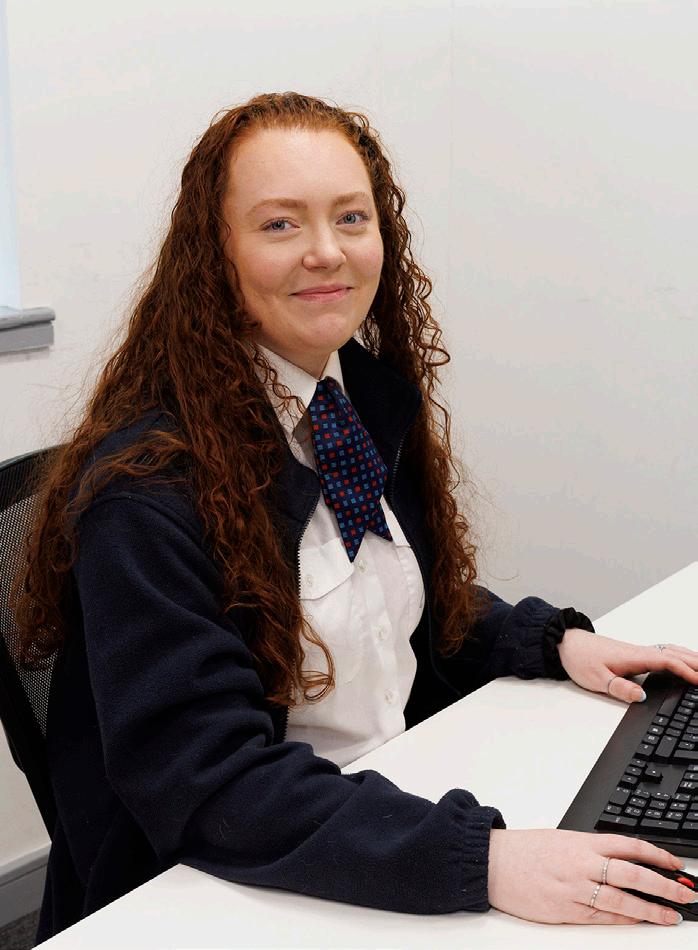

The Greater Manchester Police Male Voice Choir (GMPMVC) was launched in June 1974, just two months after the formation of GMP itself. For the first two decades or so of its existence, the choir consisted solely of serving police officers, but as the years passed it began to open its ranks to members of the public who had been appropriately vetted.
At its largest, the choir had more than 40 active members; even now it still musters up to fifteen singers for concerts locally and elsewhere in the UK, as well as overseas. It still retains one original founding member, while a few others have clocked up over 40 years of service – but new members are always welcome!
The choir’s watchword is ‘music and mirth’, with a repertoire ranging from classic numbers such as American Trilogy and Gwahoddiad to Gilbert and Sullivan, by way of Rogers and Hammerstein and more modern showtunes from musicals such as Les Misérables and Miss Saigon, all the way through to items by Perry Como and Queen, all punctuated by signature comedy moments and ad lib stylings. Its members are proud to say that there will be something for everyone – and the friends they make wherever they go would agree.
They are experienced travellers, having visited Sweden at least six times, Germany four times and Finland twice; always singing at least one item in the native language wherever they go. Reciprocal visits have been made by police choirs from each of these countries. Closer to home, the choir has undertaken four tours to both Scotland and the Isle of Man, along with jaunts to South Wales, North East England and the West Country.
For its 45th anniversary in 2019, the choir celebrated with a cruise to the Norwegian fjords, performing two concerts while on board to packed audiences: an adventure which was enjoyed by all who went on the tour. Special

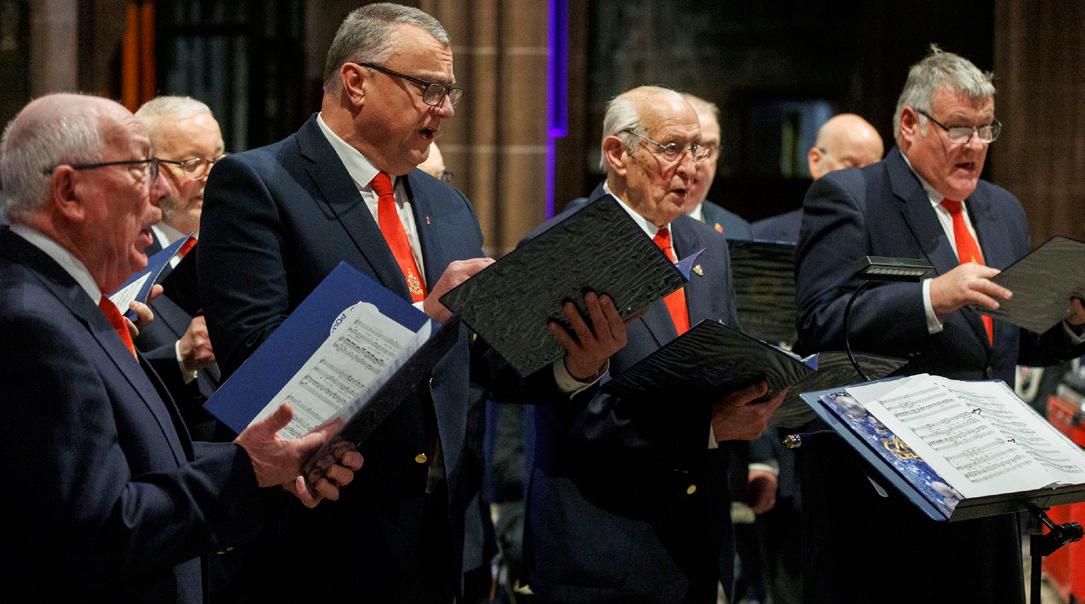
mention must also be made of North Wales, where a concert in Llandudno has been an annual feature since 1983 – always commencing with a rousing rendition of Land of My Fathers, sung in Welsh and closing with the splendid hymn tune Cwm Rhondda.
The choir performs an average of two concerts a month, and such is its popularity and reputation that bookings are often taken at least a year in advance.
GMPMVC members are both proud and privileged to have assisted in raising many thousands of pounds for numerous organisations and charities, including:
• The Deep Sea Fishermen’s Mission (in response to an invitation from Mission patron the late Queen Elizabeth II)
• Scope
• The Rainbow Trust
• Rochdale Springhill Hospice
• Bury Hospice
• Francis House Children’s Hospice
The choir has also been pleased to help many local schools and churches in his endeavours.
Singing in a choir offers a multitude of benefits that extend beyond just the joy of making music. From improved physical health and mental wellbeing to fostering social connections and a sense of community, the advantages are clear and compelling.
GMPMVC is an excellent place to start reaping these benefits, offering a welcoming environment to make fabulous music with like-minded individuals. For any man seeking to improve their wellbeing and escape daily stress, joining this choir could be a transformative experience.
If you want to join the choir, learn more about us or book the choir for a concert, please visit the GMPMVC Facebook page, website at www.gmpmvc.com or drop an email to our secretary at fpgmpmvc@gmail.com.
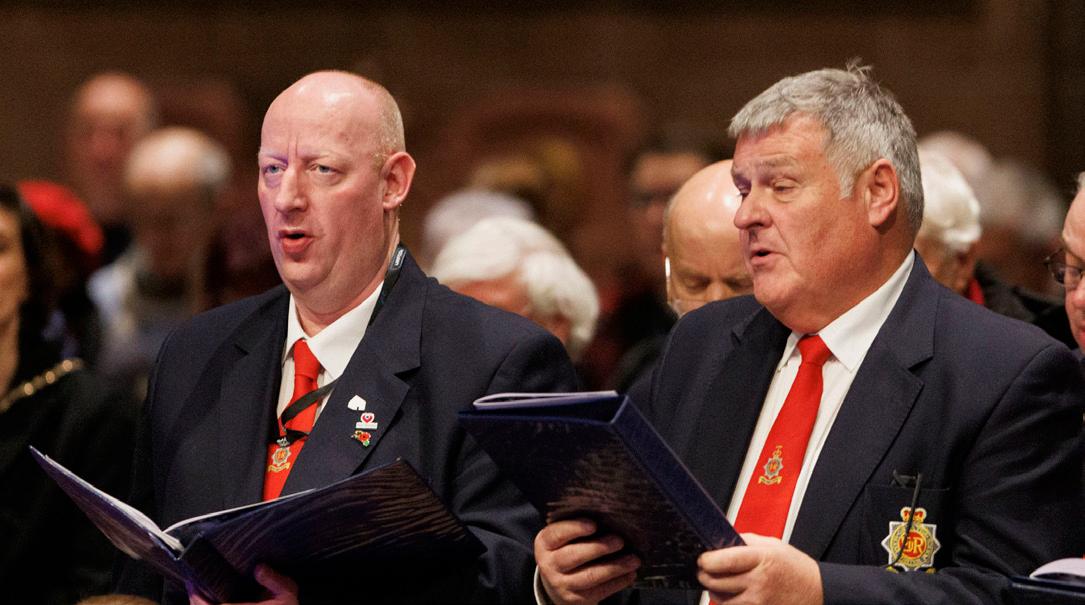

There’s something deeply nostalgic about retiring a piece of technology that has served both GMP and its communities faithfully for over a decade.
And so, as GMP’s IT branch decommissions a 12-year-old server 10 feet high and eight feet wide at its Claytonbrook data centre in order to replace it with a compact nine-inch model, there is a feeling that we are not just shutting down a machine; we’re closing a chapter in the force’s technological evolution.
A giant in its time
Back in 2012, the server was a marvel. With an astonishing one petabyte of storage (one quadrillion bytes, or 1,000 terabytes), it stood as a tribute to the force’s ambition and innovation. Housed within Cisco’s network infrastructure, this unit played a vital role in hosting some of our most iconic, memorable programmes, such as Opus, Domino, Outlook, SharePoint, GMPShared and the Y drive (which was also shut down for good on Friday 7 March 2025).
And it held its ground. Over 12 years, it experienced only one unexpected downtime – an impressive feat, given that the only recorded failure was after a penetration test. Yet, for all its resilience, this server was never quite as fast as the force had envisioned. With 100% mechanical disks, it
lacked the speed of today’s SSD-driven infrastructure. Still, it has endured, standing firm in a carefully regulated 20oC environment, ensuring the longevity of the physical hardware while effectively safeguarding critical data.
The end of an era
GMP solution architect Rob Locke said: “Despite its onceimpressive capabilities, this giant has become a relic of a bygone era, a technological dinosaur in a world that demands speed, security, and energy efficiency.
“Its replacement, by contrast, is a compact, high-performance unit just 10 inches in size – a fraction of its predecessor’s footprint, yet considerably faster, more secure and efficient.
“The new system is not just about modernisation. It represents a shift towards a cloud-based future for GMP, ensuring our organisation remains agile, cost-effective, and prepared for technological change and challenges. With easier maintenance, reduced costs, and lower energy consumption, it’s an evolution that cannot be ignored.”
Memory beyond the machine
As Rob and his IT colleagues prepared for the governmentregulated process of stripping hard drives and recycling components, the team couldn’t help but reflect. This server is more than a piece of equipment: it holds the digital memories of a generation, indelible traces of a renaissance of progress. It has borne witness to innovation, and the relentless march of time.
More about the Y drive
Due to the decommissioning of the 12-year-old server, on Friday 7 March 2025 the IT team permanently closed down the legacy GMPShared drive – an access path to all legacy network drives which were migrated away between 2012 and 2022 – and the Y drive, which had provided personal file storage before the adoption of Microsoft’s OneDrive service in 2022.
IT will not store any backups of these shares, as the data should have been migrated to other locations during the previously mentions projects and this solution was retained as the backup. For any further information about the servers or drives at GMP, please contact rob.locke@gmp.police.uk.
As part of our ongoing drive to improve the way we engage with vulnerable victims and witnesses, including children, GMP has launched a new process for arranging and conducting video interviews with children and vulnerable adults.
More than 800 officers in total have dialled into continuous professional development (CPD) sessions on the new process, while a further 110 who weren’t able to attend have watched the training video.
Comments on the training included: “This is an amazing session – what you are saying is common sense – I wish response would come on it – they would benefit so much! I am really enjoying this session, thank you!” and “This was a well needed CPD and hopefully it gets the message across how important it is to get this area of policing right.”
You can find more information, including a link to the training video, on the investigative interviewing intranet page at Home >
Operational support > Investigative interviewing.
If you have any queries, please contact DS Matt Donnelly (matthew.donnelly@gmp.police.uk), DC Jane Milner (jane. milner@gmp.police.uk) or your district video interview SPOC:
CoM South CoMvideointerviewrequest@gmp.police.uk
COM Central CoMvideointerviewrequest@gmp.police.uk
CoM North CoMvideointerviewrequest@gmp.police.uk
Salford Fvideointerviewrequest@gmp.police.uk
Tameside Gvideointerviewrequest@gmp.police.uk
Stockport Jvideointerviewrequest@gmp.police.uk
Bolton Kvideointerviewrequest@gmp.police.uk
Wigan Lvideointerviewrequest@gmp.police.uk
Trafford Mvideointerviewrequest@gmp.police.uk
Bury Nvideointerviewrequest@gmp.police.uk
Rochdale Pvideointerviewrequest@gmp.police.uk
Oldham Qvideointerviewrequest@gmp.police.uk

Welcome to the next instalment of GMP’s Back to Basics campaign, delivered by FCCO business continuity manager and force Airwave custodian Shannon Davies. This initiative focuses on ensuring that officers and staff arrive and depart their shifts correctly, have the right tools for their tasks, and address inconsistencies in device management.
As a refresher, please remember that if your radio is not working, you must never:
• Use another person’s personal issue Airwave radio in place of your own.
• Request another person’s personal issue Airwave radio to act as a pool device for your shift.
• Take your Airwave radio home, unless this has been authorised in exceptional circumstances by your chief inspector or staff equivalent.
• Share your Airwave radio PIN with another user.
• Delay reporting lost, stolen or faulty devices – any delay in reporting means a delay in removing the device from the Airwave network, which presents a security risk to the force and the wider Airwave user group.
FCCO and the radio workshops have collaboratively devised a new pool radio management process, aimed at addressing inconsistencies in device management. The process, which went live across GMP on Monday 17 February, supports best practices to ensure efficiency and safety throughout the force.
new process
If, at any point while on duty, you identify an issue with your Airwave radio – including technical faults, losing the radio or having it stolen – you must follow the new process as follows:
• Report it via the IT User Hub.
• Visit your district radio custodian (usually these will be DRMU colleagues). There will be a QR code displayed in your DRMU which you can scan to access the form for requesting a pool device.
• Once you submit the request form, a Teams alert will be generated directly to dispatch supervision in the control room, advising them of the profile changes required to ensure you map correctly on ControlWorks. They will then manually update systems and contact you to complete the required safety checks.
• The system will also generate email alerts to your DRMU custodian and radio workshops, to assist in tracking the Airwave radio devices held on your district and maintain accurate data on lost and stolen devices in line with Home Office report requirements.
Please do not contact the control room directly requesting a change. You must complete the new process in full.
Exceptions and variations: Specialist Operations and counterterrorism
• If you work in Spec Ops and carry a pool radio as a secondary device,
If you have an issue with your Airwave radio whilst on duty (faults, lost or stolen) you must follow the new process to obtain a pool radio.
these will continue to be issued according to local arrangements managed by your sergeants and inspectors. You will only be required to complete the above steps if you encounter issues with your personal issue radio.
• If you work in counterterrorism policing, please continue to liaise with your custodians to arrange the issue of covert pool devices.
Can’t remember the last time you switched your Airwave radio on?
There is ongoing work linked to the low user data report managed within radio workshops. This report currently indicates that there are high volumes of radios in issue that are not required. If you have a personal issue radio which you seldom use, please consider whether you genuinely need a personal issue device, or if you could simply utilise a pool device for those rare occasions when you need to maintain Airwave communications.
What to do outside DRMU working hours
In the event you require a pool device outside of DRMU working hours you will be required to make a request through your duty inspector, who will have access to the controlled area housing the Airwave equipment.



When Lesley Healer was injured as part of a physical training session not long after going onto division in 2023, she wasn’t too worried – the session had been particularly tough and most of the team had been hurt; as one of the older women in her class at Sedgley Park, she had taken pride in being able to keep up with the younger students in training exercises.
“I thoroughly enjoyed the training and I was over the moon to have passed all the requirements; it was a joyous moment for me to go onto district,” she says. “I didn’t think anything at all of it when I got injured. I just felt a bit sore around my hip and stomach and thought I’d taken a bit of a knock – it was nothing compared to the physical training I’d dealt with as a student. Initially I seemed to be recovering as normal, but within a fortnight I started having more pain radiating into the pelvic area.
“I couldn’t understand what was happening, it didn’t make sense to me at all – surely I should be getting better? I went to A and E and had my hip X-rayed, but they didn’t find anything unusual. The doctor sent me away with some painkillers and told me I should take some time off to recover properly.”
Painkillers and time off didn’t help. Instead, the pain became worse, and within a week Lesley was back in A and E.
“They said my liver enzymes were high and asked me how much I had been drinking; I told them I don’t drink, but they wouldn’t believe me. Eventually they recommended an ultrasound, which I had to go to my GP to get a referral for – he said it might be something or it might be nothing, and it might take two weeks or it might take four weeks. I thought: nobody is taking responsibility for my health and wellbeing here, and I know there’s something serious going on with me. So I booked a private scan myself.”
Long before joining GMP, Lesley had worked as a district nurse, so she knew what to look for in an ultrasound reading. “The scan operator said ‘you were a nurse, weren’t you?’ and turned the screen to show me. I took one look at it and knew I was in trouble: I could see all these tumours on the scan, it wasn’t a pretty picture at all.” An NHS CT scan would reveal Lesley had ‘non-curative’ stage 4 cancer in her liver, pelvis and lung.
It’s not uncommon for serious health issues in women to be ignored or overlooked by doctors, and this wasn’t the first time Lesley had to contend with a healthcare professional who wasn’t taking her seriously. She remembers a doctor she saw in 2017 about a lump in her breast telling her husband ‘I don’t know what she’s going on about’; a mammogram would reveal the lump to be an aggressive stage 2 cancer.
Women Lesley’s age who are diagnosed with terminal or chronic illnesses have other issues to deal with as well, which can hamper their recovery. They may have high-intensity or stressful jobs; the majority of caring responsibilities both for children and elderly parents still commonly rests with female relatives. It’s easy to neglect self-care.
“Self-care, for me, came very late in the day – especially as a nurse, a carer and a mother, I would be in everyone’s corner looking after everyone else, but I neglected myself. I would work a 13-hour shift on nothing but a bar of chocolate. Your body can’t do that long term – when you’re young you think you can
do it forever, but then you get a bit older and your body starts going: hang on, you’re not looking after yourself. If you so much as mentioned self-care to me 20 or 25 years ago I would have said no, there’s no time to sit down and relax and just take time for myself, I’ve got too much to do; people need me; I’m wanted.
“I wish I could go back and say to my younger self, please just take time out and look after yourself. Do the things that make you feel good, make sure you have time to switch off and have time out. It’s so important because if you don’t, you will end up really, really poorly. The most important thing is awareness and prevention – preventative care is the best care.
“So much healthcare has been withheld or hoodwinked from women; it’s been vital to be able to speak with other women my age in the same situation – you get that sisterly support from someone who gets it. We’ve all got that common thread running through where, when you’re middle-aged, you’ve often got elderly parents who need your support, but even if you’re not well yourself there’s not a lot of support available for you. When you’re going through something and the person next to you is going through something similar, you’ve already got that connection and you can communicate on a deeper level.”
14 months after Lesley’s terminal diagnosis, she’s still determined to keep going with the help and support of her husband, GMP PSD Sgt Tony Healer, and her daughters Sky and Storm. “Most terminally ill patients don’t get a great stretch. You’ll hear of people being diagnosed with stage 4 cancers and they’re gone in a few months; the majority of late-stage cancer patients I saw when I was a nurse, I wouldn’t see for very long. One of the things that’s got me through the last 14 months has been that resilience that you pick up working both in healthcare and in policing.”
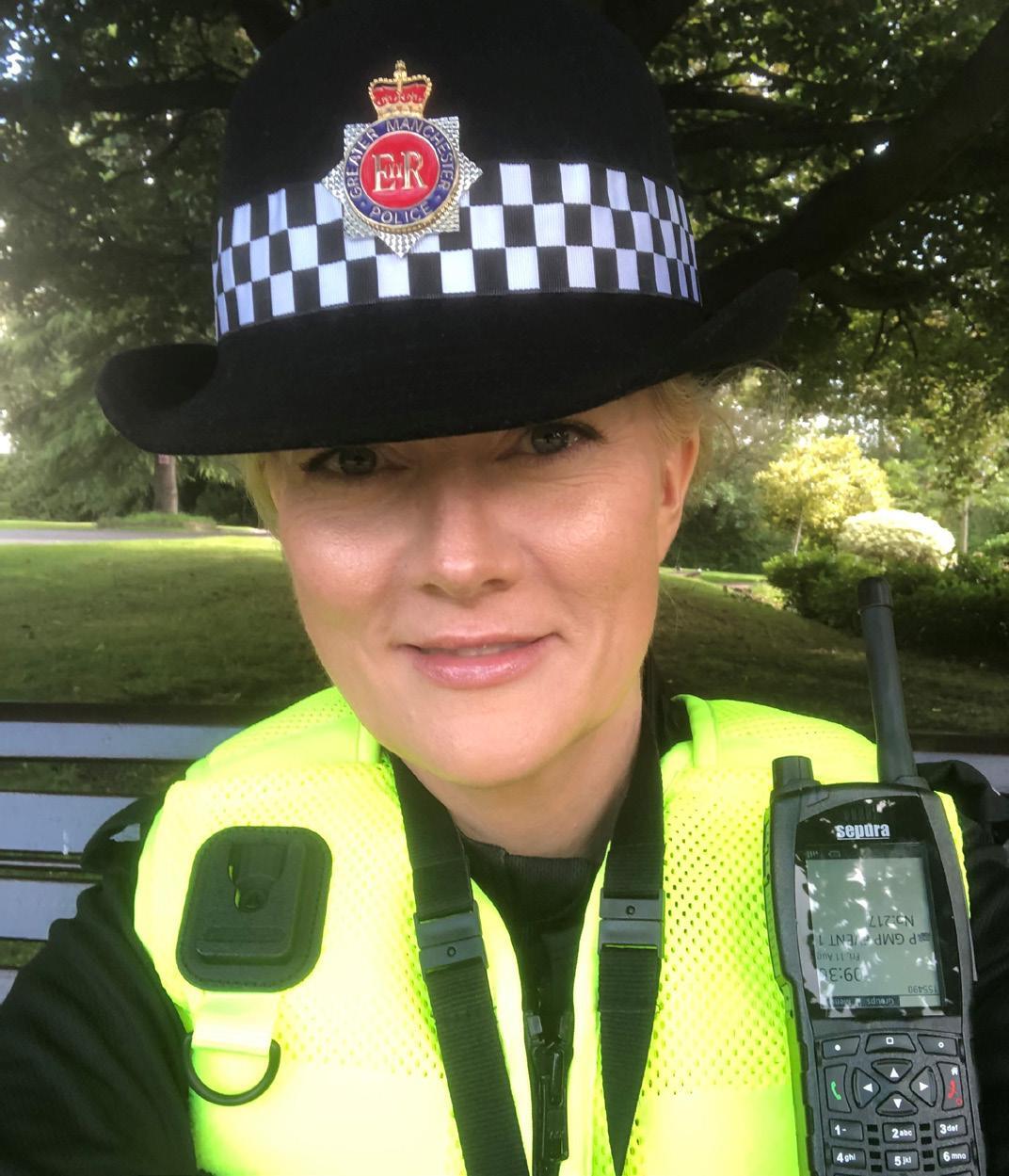
Eight men from Bolton were convicted on February 11, 2025, of serious sexual offences against underage girls after grooming them on social media.
The charges included rape, sexual assault, and sexual activity with minors aged 13 to 15, with victims describing a disturbing pattern of manipulation and abuse.
The offences took place in Blackrod between 2016 and 2018, where the offenders developed relationships with teenage girls, often providing alcohol and drugs to exploit them. Many of the men were friends of Cory Barrett, who hosted gatherings where drug and alcohol use were prevalent. Witnesses would describe how the condition of the property deteriorated after visitors punched holes through the internal doors, smashed lightbulbs and even urinated in the corners of some of the rooms.
The abuse came to light after an incident involving Daniel Flatters and a 15-year-old girl. Following an intoxicated encounter at his home, Flatters crashed a stolen car while driving her, he drove round a
bend, swerving to miss an oncoming vehicle, and crashed the car into a row of parked vehicles. The impact set the airbags off and caused a cut to the girl’s eye. This incident raised concerns among her friends, leading to the police being notified and an investigation launched.
The sentences were as follows:
• Daniel Flatters was found guilty of four counts of sexual activity with a child and had previously entered guilty pleas to supplying Class A drugs and aggravated taking without owner’s consent.
• Jack Poulson was convicted of multiple offences, including two counts of rape.
• Cory Barrett was found guilty of three counts of rape and one count of sexual assault by penetration.
• Richard Haslam was convicted on two counts of rape and other sexual offences.
• Brandon Harwood was found guilty of one count of rape and additional offences.
• Harvie Aspden and Elliott Turner were each convicted of two
counts of sexual activity with a child.
Detective Inspector Samantha Parry, Bolton CID, said: “Operation Pavarotti has been a complex and protracted enquiry whereby multiple males have now been convicted of serious sexual offences against children, a further linked trial is due to take place in March 2025 which will hopefully result in further convictions.
“This investigation and the tenacity of the officers involved (DC Rob Booth & DC Sue Barrett) has led to multiple offenders facing significant prison terms and is proof that GMP take child sexual exploitation seriously and will work tirelessly to achieve justice for the victims of CSE.
“I am beyond proud of the effort, hard work and dedication my officers have demonstrated throughout the course of this investigation and most importantly I am hopeful that the victims involved will now have some form of closure and be able to move on with their lives.
“I commend the bravery they have demonstrated during this lengthy investigation.”
Sentencing is due Summer 2025.
Bookings are now open for the Chief Constable’s annual roadshow, where the force joins together to celebrate our achievements over the past year and discuss how we want to progress in the future.
Two of the events are already fully booked, so make sure you claim your place as soon as you can!
This year’s roadshow events will be held on the following dates:
• Tuesday 6 May, Queen Elizabeth Hall, Oldham – 10am to 12 noon
• Tuesday 6 May, Queen Elizabeth Hall, Oldham – 1:30pm to 3:30pm
• Wednesday 7 May, Concorde hangar, Manchester Airport –10am to 12 noon
• Wednesday 7 May, Concorde hangar, Manchester Airport –1:30pm to 3:30pm
• Friday 9 May, Midland Hotel, city centre – 10am to 12 noon
(please note, this session is
now full)
• Friday 9 May, Midland Hotel, city centre – 1:30pm to 3:30pm (this session is now also full)
• Monday 12 May, Concorde hangar, Manchester Airport –10am to 12 noon
• Monday 12 May, Concorde
hangar, Manchester Airport –1:30pm to 3:30pm
You can book your own place, book a place for someone else or make a block booking for a team via the link on the homepage of the intranet –please make sure you have your line manager’s approval to attend.
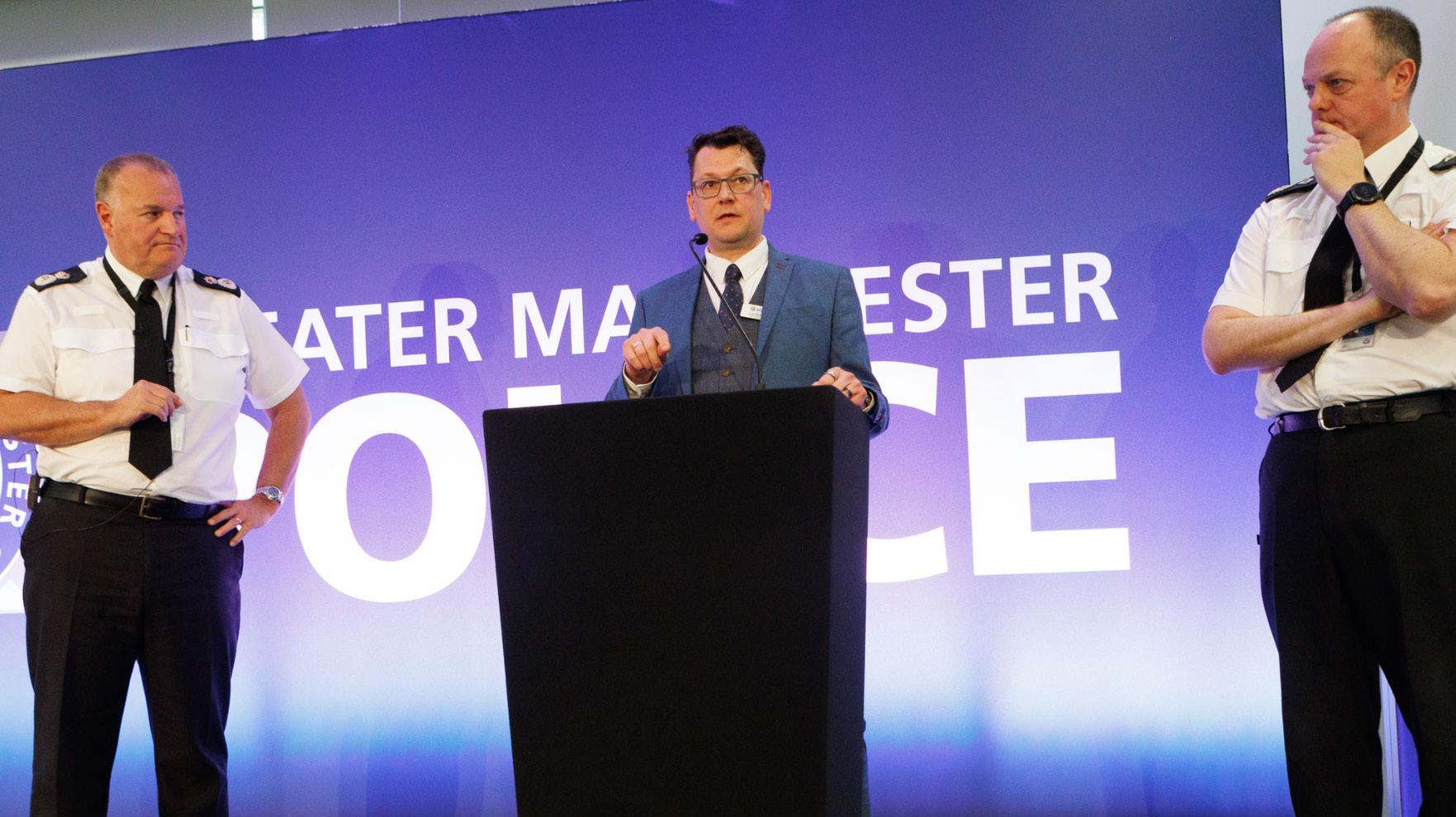
Last year’s recipients of the Chief Constable’s Annual Award for the Bravery category were recently presented with another award – the John Egerton trophy.
PC Colin Harrison, PC Joseph Dearnaley and PC Nicholas Leah were put forward for the prestigious award by the Police Federation.
The team won the Chief Constable’s Annual Award for Bravery for their courageous efforts after attending a call regarding a woman in the water at Salford Quays in October 2023.
Close to midnight, PC Colin Harrison, PC Joseph Dearnaley and PC Nicholas Leach were forced to act quickly, with low visibility and sub-zero freezing water temperatures.
They came to the rescue of the woman in the water and also dealt with her concerned husband, as well as distressed members of the public.
With no life support rings available in the immediate vicinity, the men tried to reach her with emergency rescue lines but were unsuccessful.
With crucial time ticking PCs Dearnaley and Leach got into the water and swam 60 meters in freezing temperatures to help the woman, who by this point was unable to assist in her own recovery.
PC Harrison, the designated TAU team leader, maintained command and control and ensured both officers had emergency rescue lines to keep them safe too. Members of the public assisted in pulling the officers and the woman towards the edge of the quay, using the emergency lines.
On receiving the John Egerton trophy, PC Harrison said: “Winning the prestigious John Egerton trophy was a really proud moment for us. We were delighted to win the Chief Constable’s award last year, and receiving this additional award is really special. We’re proud of the part we played in saving someone’s life – that’s reward enough in itself.”
The John Egerton trophy is awarded annually to an officer or officers of
GMP who has/have performed the most meritorious act of valour during the year, as chosen by the Police Federation. The trophy commemorates Constable John Egerton, who was killed whilst on duty in Farnworth in March 1982. He was just 20 years old when he died.
The team were presented with their award in the John Egerton suite at Bolton DHQ by DCC Terry Woods, Ch. Supt. Helen Critchley and Mike Peake from the Police Federation. John Edgerton’s family were also there to watch the presentation - his sisters Margaret, Angela, Pamela and Jacqueline.
The team have also been put through to the Police National Bravery Awards in July.
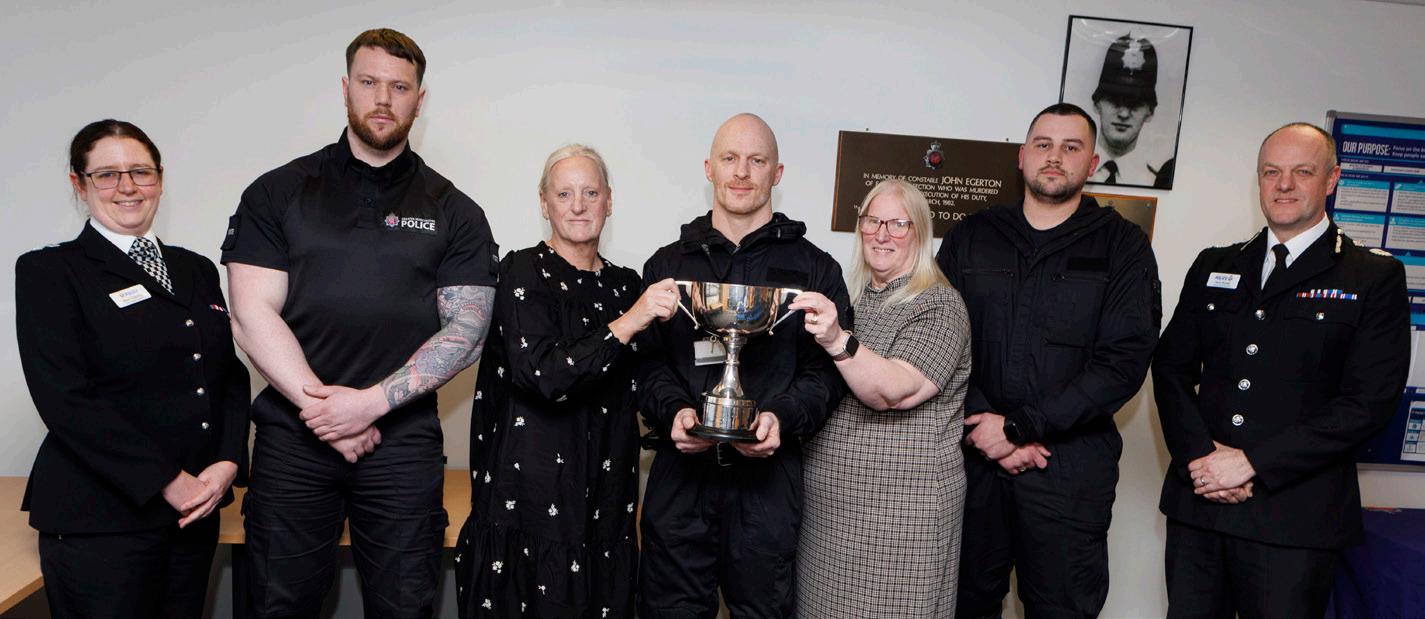
Ten of Bolton’s mini officers paid a visit to Claytonbrook recently to get a real taste for the training given to officers to help them do their job, including method of entry (MOE) and public order training.
Sergeant Oliver Cooper, PC Ciara Cushnahan and PC Chris Chadwick from Boltons’ neighbourhood team escorted
the mini officers on their exciting day out.
The children learned what tools the police use to gain entry to a property and officers explained the necessary safety measures in place to ensure their protection. The Mini Police then watched from the gallery as the officers in training prepared to role play what would happen at an event like a riot. Half of the officers
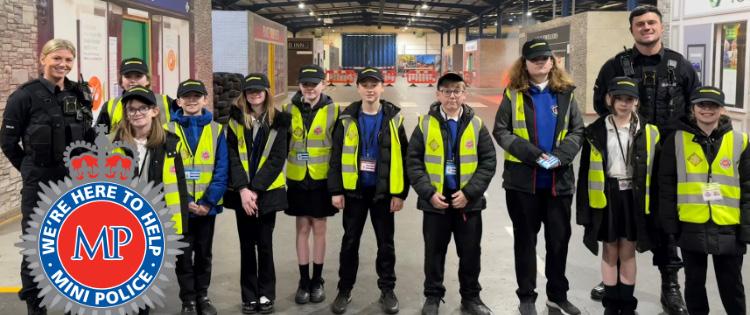
put on their protective armour as police support unit officers would, whilst the other half were poised in position as rioters, ready to bring to the exercise to life. The children watched scenes unfold with rioters throwing projectiles at officers whilst they used shields as protection and put pre-planned tactics to the test.
Sgt Cooper said: “The children found the whole experience captivating and had plenty of questions for the team at Claytonbrook. I want to say a huge thank you to the officers who took time out of their day to engage with us on our visit, the children went back to school full of excitement and told their peers all about what they had learned.
“In Bolton, running the Mini Police is a big team effort and I’d like to thank Ciara and Chris for all they do as it wouldn’t be possible without the extra work they put into it.”